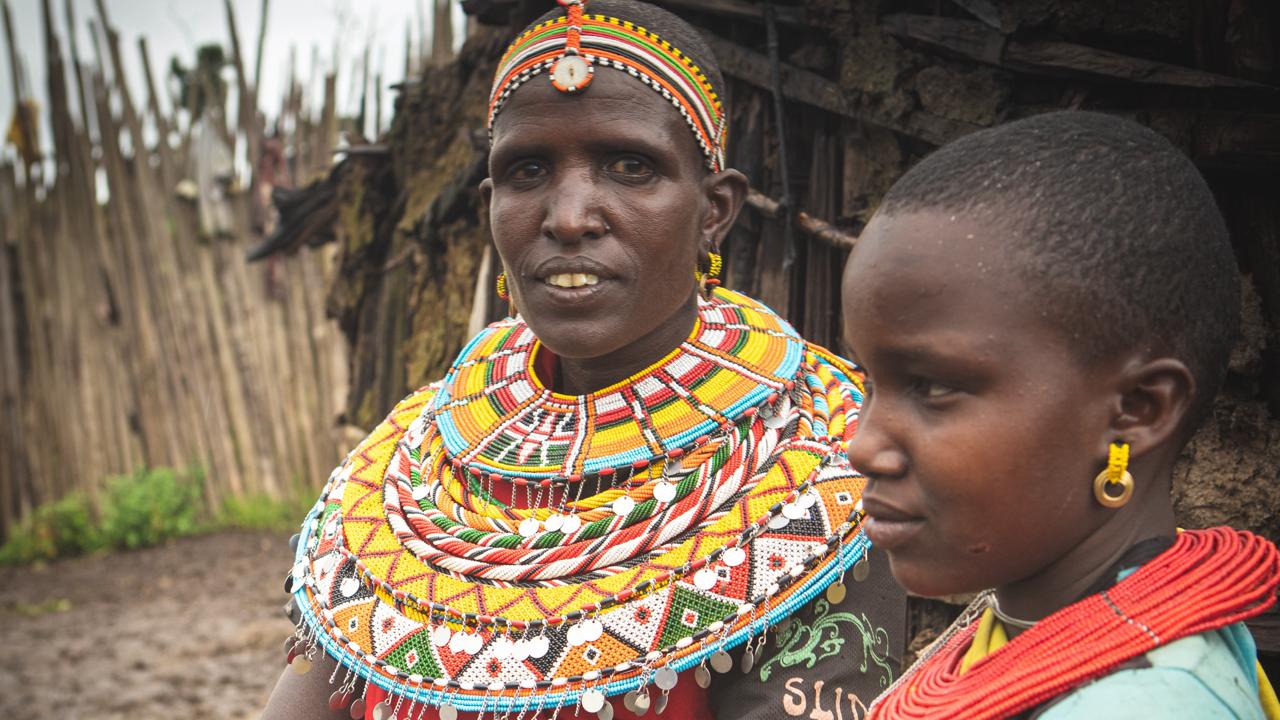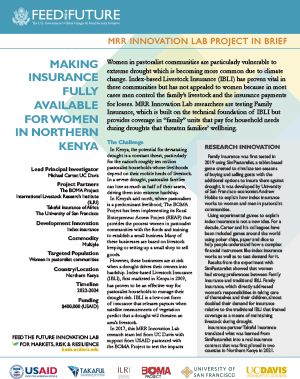
Women in pastoralist communities are particularly vulnerable to extreme drought which is becoming more common due to climate change. Index-based Livestock Insurance (IBLI) has proven vital in these communities but has not appealed to women because in most cases men control the family’s livestock and the insurance payments for losses. MRR Innovation Lab researchers are testing Family Insurance, which is built on the technical foundation of IBLI but provides coverage in “family” units that pay for household needs during droughts that threaten families’ wellbeing.
Project Overview
Lead Principal Investigator: Michael Carter, UC Davis
Project Partners: The BOMA Project, International Livestock Research Institute (ILRI), Takaful Insurance of Africa,
The University of San Francisco
Development Innovation: Index insurance
Commodity: Multiple
Targeted Population: Women in pastoralist communities
Country/Location: Northern Kenya
Timeline: 2023-2024
Funding: $644,4651
The Challenge
In Kenya, the potential for devastating drought is a constant threat, particularly for the nation’s roughly ten million pastoralist households whose livelihoods depend on their mobile herds of livestock. In a severe drought, pastoralist families can lose as much as half of their assets, driving them into extreme hardship.
In Kenya’s arid north, where pastoralism is a predominant livelihood, The BOMA Project has been implementing its Rural Entrepreneur Access Project (REAP) that provides the poorest women in pastoralist communities with the funds and training to establish a small business. Many of these businesses are based on livestock keeping or setting up a small shop to sell goods.
However, these businesses are at risk when a drought drives their owners into hardship. Index-based Livestock Insurance (IBLI), first marketed in Kenya in 2009, has proven to be an effective way for pastoralist households to manage their drought risk. IBLI is a low-cost form of insurance that releases payouts when satellite measurements of vegetation predict that a drought will threaten an area’s livestock.
In 2017, this MRR Innovation Lab research team led from UC Davis with support from USAID partnered with the BOMA Project to test the impacts of pairing IBLI with REAP. The idea was that the insurance would provide the means for new business owners to hold onto their gains in the event of drought. However, the team quickly learned that livestock insurance did not appeal to women because in most pastoralist households, men control the family’s livestock as well as the payments that come from insuring it.

Research Design
Family Insurance, developed by the MRR Innovation Lab at UC Davis, is a new type of drought insurance that supports the collective welfare of pastoralist families in Northern Kenya. Family Insurance is built from the same index and technical foundation of the well-established Index-based Livestock Insurance (IBLI) but is sold in “family” units that account for a family’s needs in times of hardship.
The research team developed Family Insurance in close collaboration with the International Livestock Research Institute (ILRI) and Takaful Insurance Africa. The payout value for coverage was calculated based on the amount of money that Kenya’s emergency cash transfer program, the Hunger Safety Net Programme (HSNP), provides to families in times of extreme need. Women could buy coverage for the number of family members needing support in a drought emergency.
In 2021, Takaful Insurance Africa launched Family Insurance with payouts to be delivered directly to insured women’s M-Pesa accounts on their mobile phones. The team launched a randomized controlled trial (RCT) in 50 study areas where half of the women could purchase Family Insurance and the other half could purchase conventional IBLI. In 2023, the research team reported results showing that 20 percent more women bought Family Insurance than conventional IBLI, and the amount they insured was 40 percent higher. These increases in coverage show significant demand for drought protection when provided in the form of support for the collective family.
The team is now measuring the broader impacts of the insurance on people’s livelihoods by scaling Family Insurance across five counties in Northern Kenya. In this expansion, Family Insurance is offered by research partner Takaful Insurance of Africa as a bundle of coverage that includes health insurance and accident insurance.
The insurance bundle is being marketed to 430 women’s savings groups made up of graduates of The BOMA Project’s 24-month REAP program. Women will also have the opportunity to pay for the insurance through Village Insurance Savings Accounts (VISAs), a new innovation through which women in these savings groups can save up over time to pay the full cost of insurance coverage during the next upcoming sales period.
Development Impact
The objective of Family Insurance is to provide women who face a high risk of losing their livelihoods to drought a way to independently take care of themselves and their children during times of hardship. This expansion of Family Insurance and its inclusion as a bundle of coverage could reduce the hardships of drought, especially on young children, while also enabling women to take advantage of opportunities like the REAP program that can help them to generate a higher income.
These impacts closely align with key objectives in the current USAID Kenya Country Development Cooperation Strategy (CDCS). First is Development Objective (DO) 2: Resilience of vulnerable populations and environments improved, and second is Development Objective (DO) 3: Economic growth opportunities, especially for young men and young women, catalyzed. Family Insurance could prove to be a powerful tool for increasing overall resilience across some of Kenya’s most vulnerable communities.
1Under three USAID awards:
- 720BFS18CA00001
- AID-OAA-LA-16-00004
- 7200AA19LE00004
